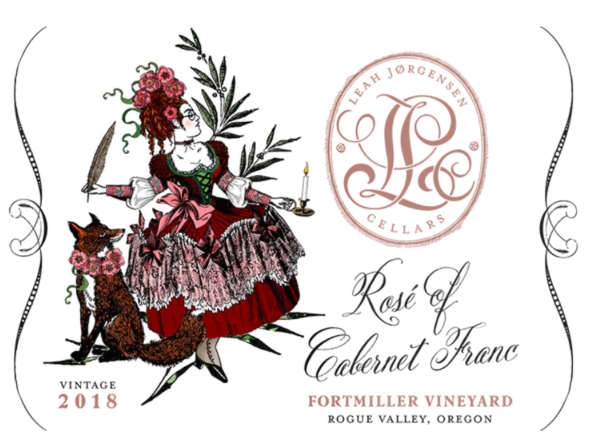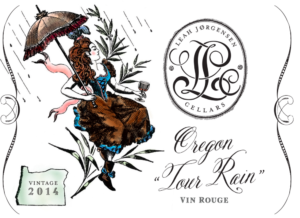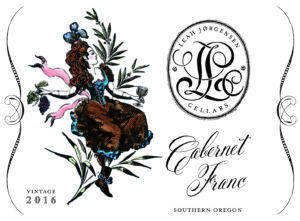
Rosé of Cabernet Franc
$1.00
| Country | USA |
|---|---|
| Region | Oregon |
| Producer | Leah Jorgensen Cellars |
| Size | 750mL |
| Style | Rosé |
| Other Features | Vegan |
This is the first vintage with a newly sourced vineyard – Fortmiller Vineyard in the Rogue Valley. Situated at 2100 feet elevation in Manita loam soil, this site has a slight eastern aspect with mountains to the west providing good air drainage. Drip irrigation is implemented throughout the vineyard with deficit irrigation as the grapes are near picking. This is a favorite site for cooler varieties – especially reds like Cabernet Franc that benefit from slow ripening. The vineyard is Salmon Safe, Oregon Certified Sustainable, and L.I.V.E. certified.
The 2018 vintage was similar to 2017 – specifically the hot, dry summer and drifting smoke from wildfires throughout the Pacific Northwest. Timely rains and cooler temperatures in early fall led to lovely fruit quality. Exceptional, elegant wines are now unfolding. Harvest in Southern Oregon was punctuated by rain near the end of September. After the rain, a spectacular fall allowed for a prolonged hang time in beautiful, moderate 80º F weather. Flavors, along with acid and sugar levels, had a lot of time to develop slowly on the vine, which allowed delayed picking. The growing season finished with outstanding fall ripening weather, producing balanced wines with low pHs contrasting sugars, resulting in finished wines with refreshing acidity and pleasant palate weight – and, thankfully, no sign of smoke-derived volatile phenolics and resveratrol causing smoke taint. The Cabernet Franc lot for this rosé was picked on September 25th at 22 Brix.
The fruit arrived at the winery via refrigerated trailer, and was gently whole cluster pressed with simple maceration for the juice to extract color and flavor from the skins. The juice remained cooled and settled in a chilled stainless steel tank for 3 days, was racked off sediment and returned to the stainless steel tank for fermentation, with starting temperatures nice and cool, allowing for a slow, steady fermentation. The resulting wine has a lovey, delicate hint of pink (“ballet slipper pink”), and a suggestion of soft, light copper tones. The wine was stabilized, filtered and bottled in February. 12.8% alcohol, 100 cases produced.
“Much like the classic quenching rosé wines from France’s Loire Valley, this dry and slightly savory Southern Oregon gem starts off bright, tart and citrusy with persistent pink grapefruit and then meanders into herbal and umami flavors with a little bit of texture on the finish. It’s a delightfully rounded rosé bursting with wonderful aromatics – at first like walking into a garden with fresh, sweet heliotrope, tea rose and sweet pea; then, gets whimsical with a whirl of cotton candy, marshmallow and marzipan notes; finally lingering with fresh fruit, scents of pink or star ruby grapefruit.”
About the Producer

"Making pretty wines in the Pacific Northwest, one barrel at a time. 100% inspiré par les vins de Loire!"
Leah Jørgensen created her own interpretations of Loire style wines based on site selection, taking a close look at what the vintage is giving her. She has worked in every capacity of the wine industry (aside from vineyard management) for the past fifteen years. She began working in the Oregon wine industry in 2004, starting at Erath Vineyards in Dundee, transitioning to Ste. Michelle Wine Estates in Woodinville, WA, and returning to Oregon to work for Adelsheim Vineyard, before offering marketing consulting for a handful of wineries. At the same time, she studied enology for two years at the Northwest Viticulture Center in Salem. She worked her first full harvest at Anne Amie Vineyards in 2009, followed by two years of cellar work at Shea Wine Cellars in 2010 and 2011. She also assisted Shea winemaker Drew Voit with his Harper Voit wines both vintages, and crafted her first small lot of Cabernet Franc in 2011. In 2012, she went on to assist winemaker Tom Fitzpatrick as his sole harvest intern at Alloro Vineyard while working on her second vintage at a new winemaking facility on Beacon Hill Vineyard in Gaston.
Leah knew she wanted to make wine the moment she visited Oregon, although she initially had an inclination to ferment grape juice back when she worked at a small winery in Virginia. It took her only a decade to realize that dream. The desire to work with Oregon fruit is definitely a nod to her father’s agricultural roots, as he grew up on a small family farm outside of Eugene. Her ultimate dream is to buy that land back one day, plant a vineyard and name it after her grandparents. Leah's passion for the Loire Valley stems from her experience working for the distributor that represented Louis Dressner Selection in her hometown of Washington, DC.
Her signature, limited Blanc de Cabernet Franc is the very first commercial still white Cab Franc made. In 2012, she added the Oregon “Tour Rain” Vin Rouge, a fruity Gamay Noir/Cabernet Franc blend inspired by the Touraine region in the Loire, and a 100% “Flat Track” Cabernet Franc – Limited Roller Derby Edition, with a portion of the proceeds benefitting Portland’s Rose City Rollers league and associated charities.
Viticulture and vinification practices: many of Leah's vineyard partners are organic in practices. They are all LIVE certified and Salmon Safe. The grapes are always hand-harvested. Depending on the vintage - Leah had issue with wildfires, and with that comes the increase vulnerability for volatile phenolics and volatile acidity - cultured yeast (saccharomyces cerevisiae) might be used as they can resist to these environments. Global warming and increased heat spikes, which introduces larger colonies of spoilage bacteria from the vineyard, esp. pediococcus bacteria, are also a factor, and the only way to mitigate these issues is to inoculate, else have another microbe start and complete fermentation - which can result in an incomplete fermentation, leading to a myriad of problems. When inoculation is needed, Leah uses mostly non-GMO, naturally sourced yeast cultures. The filtration is minimal - crossflow filtration, a gentle process that removes hazardous materials (biogenic amines), leaves the colloidal materials that give a wine its texture and mouthfeel, and removes the material that masks the natural aromatic and flavor compounds that come from the grape. Adjustment for acidity depends on the vintage and site, especially in the light of global warming.
Leah Jørgensen
related products
-
Leah Jorgensen Cellars
Oregon Vin Rouge – Tour Rain
-
Leah Jorgensen Cellars
Cabernet Franc – Southern Oregon


